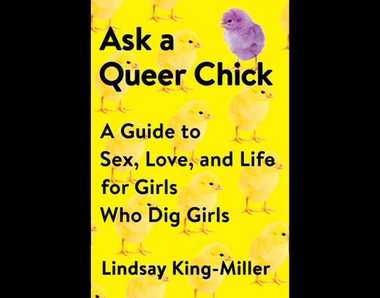Advice columnist writes guide, 'Ask a Queer Chick'

NEW YORK (AP) — From coming out to dating to dealing with discrimination, Lindsay King-Miller has put together a guide, "Ask a Queer Chick," that is tailor made for, as she describes, "girls who dig girls."
The title of the new book, out in February from the Penguin imprint Plume, is also the name of the advice column King-Miller has written online since 2011.
"I wanted to expand on some of the questions I get asked most frequently," she said in a recent interview from Denver, where she is a guest artist in creative writing at the Denver School of the Arts.
"The primary audience for the book is intended to be young LGBTQ people, but I do include a chapter that's directed at straight and cisgender people who have questions about how to interact and support the queer people in their lives," she said.
King-Miller, 28, said young people in the lesbian, gay, bisexual, transgender and queer or questioning community often don't have a personal go-to source in their lives for "compassionate guidance" or the kind of advice usually dispensed by a mother, older sister or other close friend or family member.
While she covers broad topics such as dating, breaking up and how to seek out community, King-Miller also focuses on more specific issues.
Take "lesbian bed death," for instance. She calls that an "awful term" coined in the 1980s to describe the "supposed tendency of queer women to stop having sex altogether after a few years of dating."
The term, she laughed, sounds more like a lethal disease. King-Miller notes the phenom has been "somewhat discredited" in recent years but the phrase hangs on.
"The idea of LBD makes people nervous, if you go a few days or a few weeks without having sex. You go, 'Oh no, is this lesbian bed death,'" she said. "Is this how it starts? The reality is subsequent studies have shown that all people in long-term relationships find that the frequency of their sex lives decreases, then tends to plateau and stay below what it was in the first year."
However, she said, "lesbian couples report longer sexual encounters. So while they're having sex less frequently, they're having sex for longer, and they report similar satisfaction with their sex lives as their heterosexual counterparts."
How to get a relationship off the ground is a big topic for King-Miller's column readers, since many are newly out or in the process of coming out. But dumping a partner is another matter she takes on in her book.
"Anecdotally, I think that queer women are more likely to remain friends with their exes than straight people, but we're certainly also more likely to have them in one way or another remain in our lives," she said.
"Queer social circles are just smaller," King-Miller said. "If you wanted to avoid your ex altogether you might end up feeling like you've been ex-communicated from your gay social scene. Learning to co-exist with exes in a peaceful and non-adversarial way is probably a good life skill to have across the board. It's maybe even more important for queer women because it's really hard to go through a lesbian breakup. If there's one gay bar in town you're going to see your ex there."
Coming out is one thing, King-Miller said, but being rejected by loved ones in the process is quite another. It's an area she is asked about quite a lot by her column readers. If familial rejection is likely, she counsels, "there's no shame in waiting to come out to them until you've saved up some money and are prepared to move out and support yourself."
Unfortunately, the supply of LGBTQ-friendly shelters doesn't always keep pace with the demand of young people who find themselves on the streets. And internalizing the rejection, she said, can be a struggle.
"If you do walk away from the people who raised you, you still won't be alone," King-Miller reinforces in the book. "There is a world of LGBTQ and allied people out there, many of whom would be thrilled to share support, friendship and mix CDs with you. While you're mourning what you lost, don't forget to be excited for what's ahead."
By Lenne Italie. Copyright 2016 The Associated Press.
The Gayly- 3/2/2016 @ 12:10 PM CST





